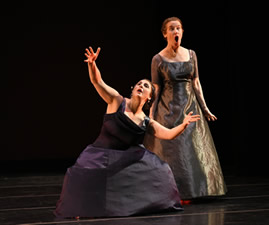David Auburn’s Proof, now at Carolina Actors Studio Theater, is ostensibly about math and madness. Robert, recently deceased, was a mathematical genius crippled by mental illness. His daughter, Catherine, knows she has inherited his brilliance and fears she may also have inherited his sickness. But while three of the play’s four characters are mathematicians, and the plot revolves around a groundbreaking mathematical proof and its authorship, the true topic of Proof is caring – and care-taking.
Twenty-five-year-old Catherine (Karina Roberts-Caporino) has spent the last four years – the prime of her life – caring for her infirm father. When the play opens, she is alone on the porch of her family home (all the action takes place on that porch), but is soon joined by her father’s apparition (George Gray). As they converse in that first scene, we already begin to understand the complexity of their relationship, the mutual need, respect, frustration, and fondness. The depth of that relationship is further revealed in two flashbacks later in the play.
Catherine’s older sister, Claire (Frances Bendert), arrives the following day for the funeral, and her well-meaning concerns and criticisms reinforce Catherine’s two great fears: that she wasted valuable time nursing her father and that she will end up as he did. Claire neither trusts nor understands Catherine, but she does care about her and wishes to care for her.
The fourth member of the ensemble (because while Pythagoras may have favored triangles, Jung preferred the number four, and Auburn is all about archetypes) is Harold Dobbs (Scott Alexander Miller). One of Robert’s former students, “Hal” is searching for both mathematical and emotional fulfillment. His mathematical quest leads him to Robert’s 103 notebooks; his emotional quest leads him to Catherine.
There is a bit of a mystery and some character development, but what really drives this play is the thoughtful working through of a complex problem – why and how do we care for each other? – and the play’s success depends on an expert ensemble of actors. The CAST quartet, directed by Tony Wright, meets that challenge.
The actors use tone of voice and body language to skillfully convey their characters’ thoughts and feelings about themselves and others. Claire’s matter-of-fact (sometimes harsh) intonation and her chin-up, crossed-arms stance provide the perfect foil to Catherine’s insecurities and longing for validation, present in her rounded shoulders, with head down and pelvis forward. One particularly brilliant moment occurs as Hal and Catherine tentatively begin to know one another. Hal has been talking about mathematics conferences and Catherine asks what all those male mathematicians do for sex, since conferences are as much about sex as about research. Hal’s squirmy, giggling response perfectly expresses his embarrassment and delight at the question.
That moment and some wry comments by Robert (“You’ll be teaching younger and more irritating versions of yourself in no time,” he says to Hal) offer glimpses of humor, and perhaps the direction could have unearthed a bit more. But, truly, the production was excellent.
And, ultimately there is no doubt about the wisdom of Catherine’s choice to devote her formative intellectual years to her father’s care. In a flashback to the moment of that decision, Robert triumphantly tells Catherine that he is well again and asks her to read his latest work from his notebook. She does, and rather than erudite calculations, they are addled (though poetic) ramblings. She reads them gently and carefully and then, with great love, leads her father out of the cold and into the house as he begs her not to leave him. It is a profoundly moving moment.
Near the play’s end, Catherine laments that while her father’s early works of genius were examples of pure elegance, her computations show evidence of being stitched together. Winner of both a Pulitzer Prize and the Tony Award for Best Play in 2001, Proof nevertheless has a few places where we see its stitches. Every once in a while, Auburn comes close to cliché. But in its summation, Proof is an elegant work, performed elegantly.
Proof continues through Saturday, June 1. For more details on this production, please view the sidebar.











